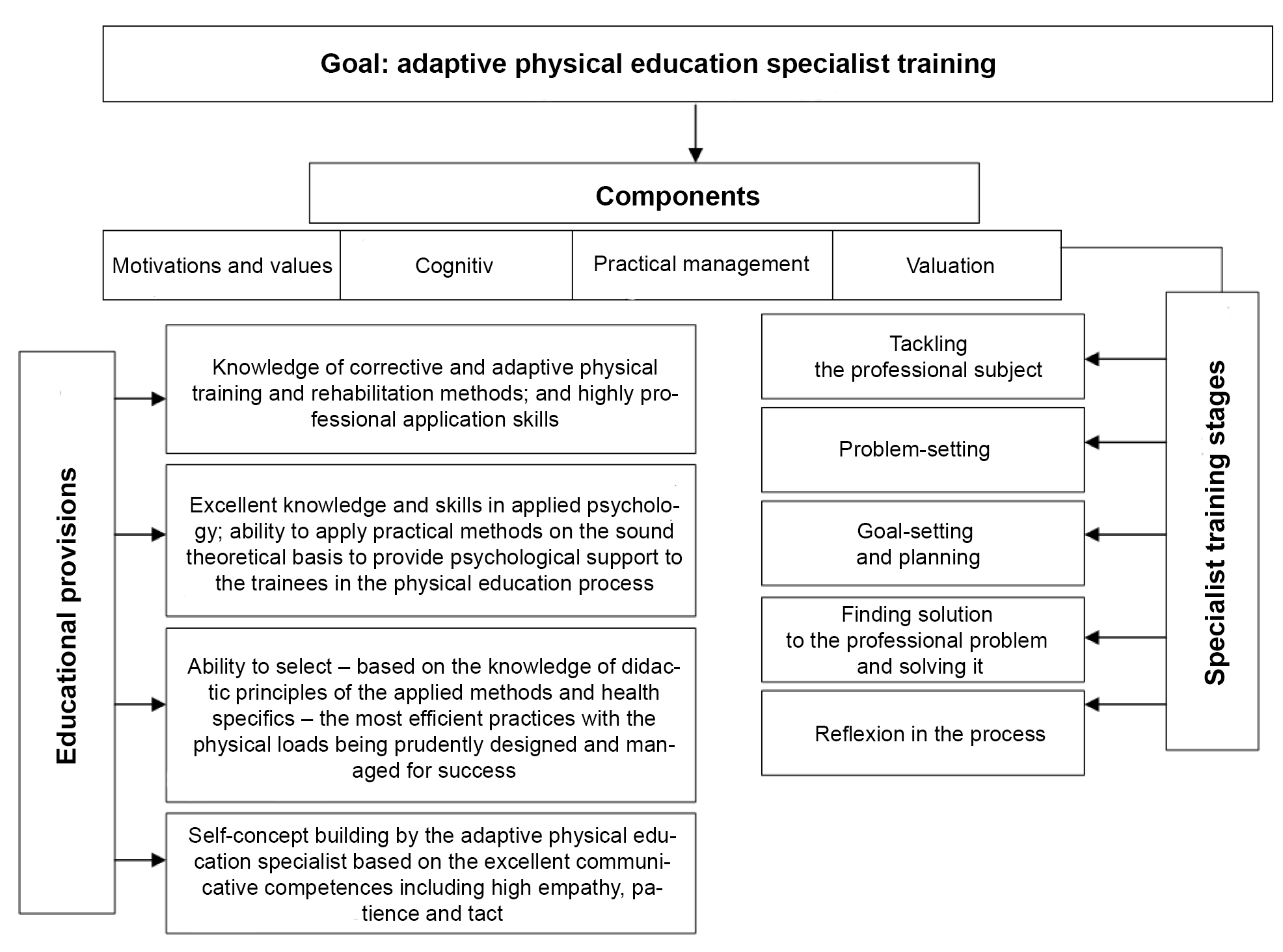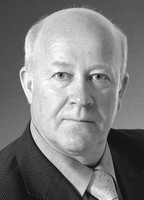Professional adaptive physical education specialist training model: design and content
Фотографии:
ˑ:
Dr.Hab., Professor F.D. Rasskazov1
Dr.Hab., Professor S.M. Kosenok1
Dr.Hab., Professor E.F. Nasyrova1
1Surgut State University, Surgut
Keywords: adaptive physical education, trainer-instructor, teaching conditions, vocational training.
Background. One of the key social trends at this juncture is the education process humanization, and it is the education specialist that plays the main role in the disabled people’s education, culture-building and self-improvement process. The specialist’s mission is to inspire people with disabilities and involve in the education process by providing them with a wide range of opportunities for their own initiative and self-reliant progress in the self-assertion and healthy lifestyle building process. Modern challenges force the national education system give a high priority to the modern education personnel training systems to help train disabled people to ensure their physical and sporting progress. Professionalism, competency and mastery of every adaptive physical education specialist are pivotal for success of the relevant health improvement, psychological and cultural programs to help socialize people with disabilities and health limitations.
An adaptive physical education specialist should not only apply proven education methods in his work but also prudently customise and individualise them for the special needs of every trainee. His core mission is to cultivate a self-development agenda in every disabled or health-impaired person and build up his/her physical abilities at the same time. The specialist must be highly knowledgeable and skilful both in the relevant physical education and sporting methods and the didactic basics for the methods being applied most efficiently. Therefore, top priority must be given to the highly competent adaptive physical education specialist training system. We have analysed the available theoretical literature on the subject to clarify the notion of the adaptive physical education specialist’s professional competency and would define it as the process and result of the corrective and developmental knowledge and skills building initiatives in the adaptive physical education domain to enable the trainee to adapt, rehabilitate and socialise people with disabilities and health limitations by helping them overcome psychological barriers on the way to the full and happy life with conscientious appreciation of their own contribution to the social life and progress [1, 2].
Objective of the study was to develop an adaptive physical education specialist training model (frame design and content) and outline the key educational provisions for its successful implementation.
Methods and structure of the study. The study was performed at the Sports and Rehabilitation Centre for the Disabled in Surgut, with 11 adaptive physical education trainer-instructors being surveyed.
The survey revealed the key problems faced by the adaptive physical education specialists in their practical work with disabled and health-impaired people; and identified the design-, level- and class-specific professional competency rating criteria for the adaptive physical education specialists. The survey data and analyses were used to develop the adaptive physical education specialist training model and outline the necessary educational provisions for its effective implementation.
In the primary rating of the professional competency of each adaptive physical education specialist, each of the above competency components was examined. We applied the following methods to rate the adaptive physical education specialist competency components: questionnaire survey form; interview; work process monitoring; knowledge and skills rating tests; expert valuations; and diagnostic tools. Basically we applied the following methods in the survey:
– C. Zamfir’s Work Motivation Inventory (modified by A. Rean);
– Rokeach Value Survey; and
– Organizational and Communication skills (OCS) Test.
Study results and discussion. The survey and test data obtained by the above methods were summarised to rate the professional competency of every adaptive physical education specialist and put them into individualised data integration and test matrix. The matrix was designed to include three independent modules to cover the above professional competency components and integrate all the rating data.
The cognitive component of every adaptive physical education specialist professional competency was rated by the relevant competency criteria and standards using a set of questions and tests of the theoretical knowledge and professional action algorithms (skills) pivotal for the professional progress.
The practical management component of every adaptive physical education specialist’s professional competency was rated by an expert monitoring and valuation of the actual professional work process using the relevant competency standards and criteria with an emphasis on the performance quality and reasonability. In the rating process we focused on the subject’s independence, sapience and versatility in selecting and applying the most appropriate methods and tools in the existing practical conditions, including the ones of his/her own design if any. Every practical management component element within the integrated test matrix was rated for correctness, relevance and reasonability of the applied method; in addition, we rated the decision-making independence and efficiency and individual logics in selecting practical methods and tools.
The motivation-and-values component of the adaptive physical education specialist’s professional competency was rated using the relevant competency standards and criteria by a questionnaire survey form followed by interviews to detect the individual motivations for professional career. In addition, we applied a set of motivation tests and methods to rate the motivation-and-values component.
As a result, we obtained the survey and test data arrays to precisely rate the adaptive physical education specialist’s professional competency in each of its components.
Based on the above data, we have developed the adaptive physical education specialist training model (frame design and content) that may be described as a harmonic system composed of interrelated components: see Figure 1 hereunder. It should be noted that the adaptive physical education specialist mission is to reasonably and systemically apply his/her knowledge and skills to find and apply the most efficient tools for the disabled and health-impaired people’s socialisation. Each of the above adaptive physical education specialist competency building model components is secured by the relevant training technology including the following stages: tackling the professional subject; problem-setting; goal-setting and planning; finding solution for the professional problem and its solving; and reflexion in the process [3].

Figure 1. Adaptive physical education specialist training model: frame design and content
The study data and analyses provided us with the grounds to conclude that the adaptive physical education specialist professional competency (when the relevant educational provisions are in place) must include: (1) Knowledge of the corrective and adaptive physical training and rehabilitation methods and highly professional application skills; (d) Excellent knowledge and skills in applied psychology; ability to apply practical methods on the sound theoretical basis to provide psychological support to the trainees in the physical education process, motivate them for their own health building activity; cultivate self-confidence in them and motivate them for success based on the personality qualities improvement and health limitations correction activity; (3) Ability to select – based on the knowledge of didactic principles of the applied methods and health specifics – the most efficient practices with the physical loads and intensities being prudently designed and managed for success; and (4) Self-concept building by the adaptive physical education specialist based on the excellent communicative competences including high empathy, patience, tact, ability to forecast communicative situations and find the most efficient communication models to attain the desired result; with a special emphasis on the high respect to the disabled and health-impaired people to help them cultivate due self-confidence and willpower [4].
Conclusion. The fact-finding stage of our study showed that the proposed adaptive physical education specialist training model (frame design and content) may facilitate professional success of an adaptive physical education specialist conditional on the relevant educational provisions being put in place.
References
- Bakharev Y.A. Model professionalnoy podgotovki spetsialistov po adaptivnoy fizicheskoy kulture [Professional training model for adaptive physical education specialists]. Mater. vseros. zaochnoy nauch.-prakt. konf. s mezhdunar. uchastiem "Aktualnye problemy sovremennogo obshchestva i rol nauki v ikh razreshenii" [Proc. Rus. res.-pract. teleconf. with internat. partic. "Actual problems of modern society and the role of science in their resolution"]. Ekaterinburg: IP Birulya N.I. publ., 2011.
- Bakharev Y.A. Formirovanie gotovnosti k professionalnoy deyatelnosti u spetsialistov po adaptivnoy fizicheskoy kulture [Professional training of adaptive physical education specialists]. Mater. X vseros. nauch.-prakt. konf. stud. i aspirantov "Nauka i molodezh" [Proc. X Rus. res.-pract. conf. of students and postgraduates "Science and youth"], N. Novgorod: VSEPU publ., 2009, T. 1.
- Muller O.Y. Sovremennaya model metodicheskoy gotovnosti pedagogov k rabote v usloviyakh inklyuzivnogo obrazovaniya [Modern model of teachers' methodical competency to work in inclusive education conditions]. Tsennosti i smysly, 2017, no. , pp. 149-158.
- Ob utverzhdenii professionalnogo standarta «Trener-prepodavatel po adaptivnoy fizicheskoy kulture i sportu». Prikaz Mintruda Rossii ot 04.08.2014 N 528n (Zaregistrirovano v Minyuste Rossii 02.09.2014 N 33933). [On approval of professional standard "Trainer-instructor in adaptive physical education and sports". Order of the Ministry of Labour of Russia dated 04.08.2014 N 528n (Registered in the Ministry of Justice of Russia on September 2, 2014 N 33933)]. ATP "ConsultantPlus".
Corresponding author: lesi_rasskazov@mail.ru
Abstract
Modern challenges force the national education system give a high priority to the modern education personnel training systems to help train disabled people to ensure their physical and sporting progress. One of the key missions of the process is to facilitate the personality self-fulfilment and socialising process via due provisions for the healthy lifestyle of this vulnerable group being put in place. Therefore, the national education system takes efforts to train highly-skilled adaptive physical education specialists. The authors have analysed the available study reports on the subject to give a definition of the adaptive physical education specialist’s professional competency with its key components and the relevant training technologies (and training stages) for the adaptive physical education specialist training process.
Subject to the study was an adaptive physical education specialist training model. At the fact-finding stage, the authors made a special emphasis on the challenges faced by the adaptive physical education specialists in the disabled people training processes; and identified the design-, level- and class-specific professional competency rates of the adaptive physical education specialists. The study data and analyses were used to develop the adaptive physical education specialist training model and outline the necessary educational provisions for its effective implementation.




 Журнал "THEORY AND PRACTICE
Журнал "THEORY AND PRACTICE